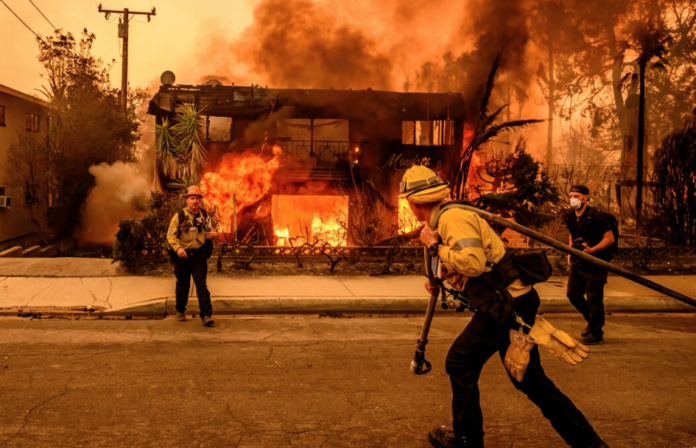Multiple lawsuits were filed Jan. 13 in Los Angeles Superior Court against electric utility company Southern California Edison (SCE), accusing the company of causing one of the two major fires burning in Southern California.
The lawsuits alleged the company failed to de-energize its power lines, sparking the Eaton fire, which has burned more than 14,000 acres in the neighborhood of Altadena, northeast of Los Angeles, and caused at least 16 deaths since it erupted a week ago.
Authorities haven’t yet determined an official cause of the fire. However, video taken during the fire’s early minutes shows a large blaze directly beneath electrical towers.
The lawsuit alleges the Eaton Fire was caused by SCE’s “failing to de-energize its overhead distribution and/or transmission power lines traversing Eaton Canyon on the evening the Eaton Fire started despite a Red Flag [Particularly Dangerous Situation] warning being issued by the National Weather Service the day before.”
Attorneys for Evangeline Iglesias, another resident who lost her Altadena home, also filed a lawsuit on Monday.
Jeff Monford, a spokesperson for SCE, told The Epoch Times, “SCE understands that a lawsuit related to the Eaton fire has been filed, but has not yet been served with the complaint.”
“SCE will review the complaint when it is received. The cause of the fire continues to be under investigation,” Monford said, “Our hearts remain with our communities during this devastating fires. … SCE crews, contractors and mutual assistance partners are dedicated to safely restoring power to our customers.”
The Eaton Fire erupted around 6:15 p.m. on Jan. 7.
SCE wrote in the report, “SCE submits this report out of an abundance of caution because the incident may meet the technical reporting criteria,” citing in addition to the counsel’s notice, “there are online publications that seemingly suggest SCE equipment may be associated with its cause.”
SCE also said “preliminary analysis by SCE of electrical circuit information for the energized transmission lines going through the area for 12 hours prior to the reported start time of the fire shows no interruptions or electrical or operational anomalies until more than one hour after the reported start time of the fire.”
According to California’s laws and CPUC’s policies, utility companies are liable for wildfires caused by their equipment regardless of whether they are found to have acted negligently. The state’s laws and policies also allow utilities to pass the costs onto ratepayers, resulting in rate hikes.
The report also said California utility companies have “spent unprecedented amounts” on wildfire mitigation, and electricity rates have often increased as a result.
Some of the largest and most destructive wildfires in California’s history include the 2018 Camp fire, the 2019 Kincade fire, and the 2021 Dixie fire in northern California, the 2017 Thomas fire and 2018 Woolsey fire in Southern California, and the 2007 Witch fire in San Diego County, which were all caused by utilities’ power lines or equipment.






















